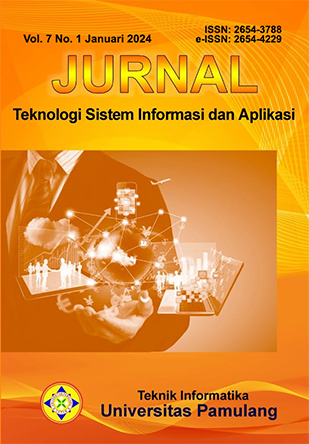Pengembangan Sistem Pemantauan Perkuliahan Jurusan Teknik Informatika Universitas Halu Oleo Berbasis Website dengan Agile Development Methods
DOI:
https://doi.org/10.32493/jtsi.v7i1.35188Keywords:
Monitoring, System, Agile, Website,Abstract
To keep up with the ongoing progress in information and communication technology, the administration of academic activities at the Department of Informatics Engineering at Halu Oleo University must adjust its methods to ensure optimal efficiency and precision. An important aspect is the monitoring of lectures, which now depends on a manual approach, such as traditional methods of documenting attendance. Common problems include extended data processing time, vulnerability to data loss, and frequent recording errors. To tackle these difficulties, this work utilizes the Agile Extreme Programming approach to construct a web-based lecture monitoring system. The system is designed to streamline the process of recording and tracking professor attendance by engaging all pertinent stakeholders, such as class coordinators, lecturers, and administrators. The system offers versatility to students and professors in data management, while also allowing administrators to oversee course information, faculty members, students, and academic terms. The adoption of the Agile Extreme Programming methodology in the development of this web-based lecture monitoring system has effectively addressed the efficiency issues encountered in the lecture monitoring process at the Department of Informatics Engineering, Halu Oleo University. Adopting a web-based system has enhanced the efficiency of academic activity management by replacing manual signature-based attendance sheets. This transition has facilitated the recording of lecturer attendance and the monitoring of lectures. The research findings underwent evaluation through the black box testing methodology and produced outcomes consistent with anticipated outcomes.
References
Arwaz, A. A., Kusumawijaya, T., Putra, R., Putra, K., & Saifudin, A. (2019). Pengujian Black Box pada Aplikasi Sistem Seleksi Pemenang Tender Menggunakan Teknik Equivalence Partitions. Jurnal Teknologi Sistem Informasi Dan Aplikasi, 2(4), 130. https://doi.org/10.32493/jtsi.v2i4.3708
Carolina, I., & Rusman, A. (2019). Penerapan Extreme Programming Pada Sistem Informasi Penjualan Pakaian Berbasis Web (Studi Kasus Toko ST Jaya). INOVTEK Polbeng - Seri Informatika, 4(2), 157. https://doi.org/10.35314/isi.v4i2.1043
Carolina, I., & Supriyatna, A. (2019). Penerapan Metode Extreme Programming dalam Perancangan Aplikasi Perhitungan Kuota SKS Mengajar Dosen. IKRA-ITH Informatika: Jurnal Komputer Dan Informatika, 3(1), 106–113. https://journals.upi-yai.ac.id/index.php/ikraith-informatika/article/view/306/198
Hanafri, M. I., Triono, T., & Luthfiudin, I. (2018). Rancang Bangun Sistem Monitoring Kehadiran Dosen Berbasis Web Pada STMIK Bina Sarana Global. Jurnal Sisfotek Global, 8(1). https://doi.org/10.38101/sisfotek.v8i1.175
Irsandi, J. S., Fitri, I., & Nathasia, N. D. (2020). Sistem Informasi Pemasaran dengan Penerapan CRM (Customer Relationship Management) Berbasis Website menggunakan Metode Waterfall dan Agile. Jurnal JTIK (Jurnal Teknologi Informasi Dan Komunikasi), 5(4), 346. https://doi.org/10.35870/jtik.v5i4.192
Kurniawan, T.B., & Syarifuddin (2020). Perancangan Sistem Aplikasi Pemesanan Makanan dan Minuman Pada Cafetaria NO Caffe di TAnjung Balai Karimun Menggunakan Bahasa Pemrograman PHP dan MySQL. Jurnal Tikar, 1(2), 192–206. https://ejurnal.universitaskarimun.ac.id/index.php/teknik_informatika/article/download/153/121
Pohan, S. D., & Firdaus, I. (2022). Implementation of Extreme Programming Method in the Development of Pekanbaru Community Training Information System. Cyberspace: Jurnal Pendidikan Teknologi Informasi, 6(1), 20. https://doi.org/10.22373/cj.v6i1.11851
Septiani, N. A., & Habibie, F. Y. (2022). Penggunaan Metode Extreme Programming Pada Perancangan Sistem Informasi Pelayanan Publik. Jurnal Sistem Komputer Dan Informatika (JSON), 3(3), 341. https://doi.org/10.30865/json.v3i3.3931
Setiawan, W. (2017). Era Digital dan Tantangannya. Seminar Nasional Pendidikan. Seminar Nasional Pendidikan, 1–9.
Widodo, D. W., Sahertian, J., & Setiawan, A. B. (2018). Sistem Monitoring Perkuliahan Di Universitas Nusantara Pgri Kediri. Joutica, 3(2), 183. https://doi.org/10.30736/jti.v3i2.232
Wijayanto, S. (2020). Analisa perancangan model sistem monitoring, pencatatan dan pengiriman hasil produksi truk dengan Remote File Transfer System (RFTS) pada perusahaan XYZ menggunakan metode System Development Life Cycle. Jurnal Nasional Komputasi Dan Teknologi Informasi (JNKTI), 3(1), 1–8. https://doi.org/10.32672/jnkti.v3i1.1766
Downloads
Published
How to Cite
Issue
Section
License
Copyright (c) 2024 Muhamad Amhar Rayadin, Nabilla Salsa Billa, La Ode Jafar Umar Thalib, Rizal Adi Saputra

This work is licensed under a Creative Commons Attribution-NonCommercial 4.0 International License.
Authors who publish with this journal agree to the following terms:
- Authors retain copyright and grant the journal right of first publication with the work simultaneously licensed under a Creative Commons Attribution License that allows others to share the work with an acknowledgement of the work's authorship and initial publication in this journal.
- Authors are able to enter into separate, additional contractual arrangements for the non-exclusive distribution of the journal's published version of the work (e.g., post it to an institutional repository or publish it in a book), with an acknowledgement of its initial publication in this journal.
- Authors are permitted and encouraged to post their work online (e.g., in institutional repositories or on their website) prior to and during the submission process, as it can lead to productive exchanges, as well as earlier and greater citation of published work (See The Effect of Open Access).
Jurnal Teknologi Sistem Informasi dan Aplikasi have CC BY-NC or an equivalent license as the optimal license for the publication, distribution, use, and reuse of scholarly work.
In developing strategy and setting priorities, Jurnal Teknologi Sistem Informasi dan Aplikasi recognize that free access is better than priced access, libre access is better than free access, and libre under CC BY-NC or the equivalent is better than libre under more restrictive open licenses. We should achieve what we can when we can. We should not delay achieving free in order to achieve libre, and we should not stop with free when we can achieve libre.
This work is licensed under a Creative Commons Attribution-NonCommercial 4.0 International (CC BY-NC 4.0) License
YOU ARE FREE TO:
- Share - copy and redistribute the material in any medium or format
- Adapt - remix, transform, and build upon the material for any purpose, even commercially.
- The licensor cannot revoke these freedoms as long as you follow the license terms



_2020_-_7(2)_2024_-_Thumbnail.png)












